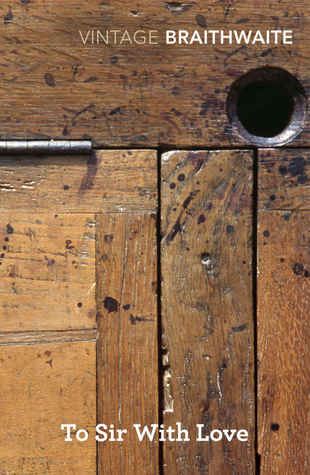Adventures in Bookland: To Sir, With Love by E.R. Braithwaite

To Sir, With Love by E.R. Braithwaite
Read my name. ‘Edoardo Albert.’ If, from that, you guess that I am part Italian you would be right. But what’s not nearly so obvious is that ‘Albert’ comes from my Sri Lankan father. And he is properly Sri Lankan: Tamil on his father’s side and Sinhala on his mother’s side (which is a whole other story). Anyone familiar with Sri Lankan names will know that ‘Albert’ is missing at least three syllables to make a proper Sri Lankan name (and that applies to both Sinhala and Tamil). So I share something with the author of To Sir, With Love. Because you would not think that Mr E.R. Braithwaite orginally hailed from Guyana and was even blacker than my own grandparents. But Braithwaite shared with C.L.R. James, and my own ancestors, something that is seldom given much credence nowadays: they were children of the British Empire who believed in its values. At least, those values that espoused concepts such as fairness, gentlemanly behaviour, self-restraint and a thoroughgoing appreciation for education and the highest and noblest elements of British culture (the more down market parts were not at that time exported to the colonies). C.L.R. James, the great Caribbean writer, grew up with a lifelong love of Thackeray’s Vanity Fair and a better understanding and appreciation of English literary culture than almost anyone. Braithwaite’s parents both went to Oxford University, as he did too, but only after serving in the RAF during World War II. Braithwaite was a war hero, an Oxford graduate with a doctorate in physics: he was as exemplary a man as one might find.
So it was with growing horror that Braithwaite realised, in the 1950s, that all his accomplishments and endeavours stood for nothing in Britain when stood next to his black skin. This realisation was made all the worse in that he had not encountered any prejudice while serving in the RAF during the war. But having come down from Oxford, he would attend job interviews, only to be told by the interviewing panel that it was none of their doing but that the men he would be in charge of might not take kindly to being managed by a black man.
The anger this slowly stoked in Braithwaite was exacerbated by the deep sense that the prejudice he was encountering was a betrayal of the British values that he had imbibed and espoused: the British were not playing by their own rules. There’s few things less British than that (except, possibly, queue jumping). It was wrong. It was deeply, woundingly, horribly wrong. Such unfairness was thoroughly, there’s no other word for it, unBritish.
As an aside, the end of Empire was, I think, as much bound up with the realisation among the peoples of the colonies that the ideals that they had bought into, that had seen my own ancestors take a British name, were not honoured among the British themselves. For too many, skin colour trumped culture: even men as thoroughly British as Braithwaite and James were not accepted as equals in the mother country. That sense of unfairness drove much of the initial push towards independence in many of the former countries of the Empire.
Braithwaite himself finally found a job teaching in a tough East End secondary school and To Sir, With Love is his account of his time there, the students, the teaching, the teachers. Given Braithwaite’s previous accomplishments, it’s no surprise that he does well, but the writing is elegant and cultured in the fullest sense of the term: how many contemporary teachers working in the East End would take the bus to their first day looking forward to walking the streets of Chaucer and Erasmus, to looking up the old abbey of the Sorores Minores (I had to look it up myself: they were Franciscan sisters living at the Abbey of the Minoresses of St Clare without Aldgate). It also serves as a view into a time that is not far off historically – less than 70 years – but that seems much further away culturally. It’s a view into the thoughts and feelings of the sort of man whom the British had been educating during the first half of the 20th century and an illustration of how well that education had succeeded and, therefore, why it failed.
Like Braithwaite, like James, like my own great-grandfather, we expected the British to play by the rules and were horrified and hurt when we learned that there were actually two sets of rules, according to so accidental a criterion as colour. The British Empire ultimately died from the embarrassment at the divide between its ideals and its realities.
0 Comments